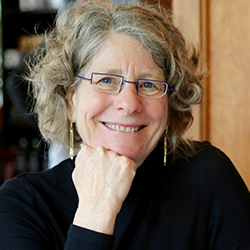
UW Information School Professor Batya Friedman gave the North American keynote address at this year’s iConference, an annual gathering of faculty representing iSchools from around the world.
In the address, titled “Structure, Scale, and Time: iSchools, Artificial Intelligence, and which Future,” Friedman spoke about multi-lifespan design and how taking a structural, longer-term approach has fundamentally changed her thinking about design and design processes.
Friedman introduced the constructs of structure, scale and time and spoke about her first substantive use of them through the Voices from the Rwanda Tribunal research project. Then she turned to her main topics: the future of iSchools and the development of the information field; and the material and environmental costs of artificial intelligence systems.
Friedman pointed to structural changes that will unfold over time for iSchools as their faculties evolve. In thinking about the future, Friedman proposed that iSchools “balance i-identity with i-interdisciplinarity.” “At the individual school level and as a field, think intentionally about the disciplinary makeup of iSchool faculty,” Friedman explained. “The faculty we put in place today will continue to shape the field in 30, 40, 50 years.”
Friedman’s talk later turned to the lifecycle and impact of the hardware, energy and infrastructure needed to run artificial intelligence, machine learning, and data-driven systems. Friedman’s recommendations included developing metrics for the lifecycle of such systems, accounting for their material and environmental costs; and encouraging the development of systems with less environmental impact.
Hosted by the iSchools at Kyushu University, University College Dublin and the University of Texas at Austin, and presented by the iSchools organization, iConference 2022 was held online from Feb. 28 to March 4.
Also representing the UW iSchool at the iConference was Ph.D. candidate Yvette Iribe Ramirez. She presented her short paper titled “A Digital Bridge: Increasing Digital Access to Low-Income Job Seekers and the Role of Community Organizations.” The paper is co-authored by Stacey Wedlake, who is a research scientist with the iSchool’s Technology & Social Change Group.
In the paper, Ramirez and Wedlake detailed their explorations of the lessons learned from the Digital Bridge project, which is a pilot program by the City of Seattle and the Seattle Jobs Initiative (SJI) aimed at providing reliable internet access and digital devices to current job seekers working with SJI. They also presented their findings of how organizational relationships affect program implementation.
Additionally, Chris Coward and Carole Palmer presented a panel titled “LIS Forward Forum: Shaping Future Directions for LIS to Thrive and Grow in iSchools.” They were joined by co-presenters Maria Bonn of the University of Illinois at Urbana-Champaign and Mega Subramaniam of the University of Maryland, and the iSchool's Chance Hunt served as one of the discussion facilitators.
The panel discussion looked to the future of research and education in library and information science. At a time when the field and information schools are becoming more multidisciplinary, participants were asked to reflect on how the role of library and information science has evolved within iSchools. The session aimed to inform priorities for a summit later this year.